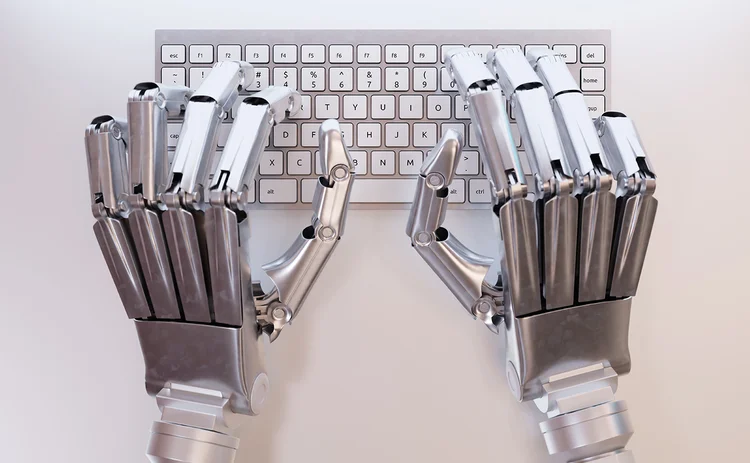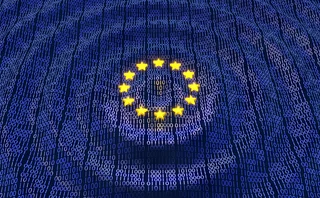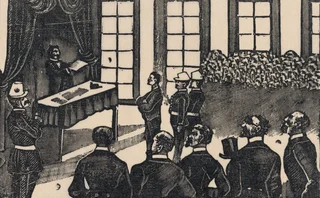Will Robots Save Us From Robots?
Is artificial intelligence the key to properly surveilling the markets?

The market, it seems, is ready to fight fire with fire.
As electronic trading continues to get more advanced, so too does the complexity around properly surveilling it.
It takes months—often years—to properly digest market events. Trades are pieced together during exhaustively long processes that not only take up a lot of time, but also are extremely costly.
So it was only a matter of time before the decision was made to start using the technology that created such a complicated place to help understand it.
Turning to the Robots
By using artificial intelligence to monitor their firms' trading, they could potentially free up staff in their compliance department to work on the laundry list of other tasks that need to be addressed.
On Tuesday, a story published by Reuters elaborated on that very theory. Nasdaq, the London Stock Exchange Group (LSEG) and the Financial Industry Regulatory Authority (Finra) are all investigating ways to use artificial intelligence for market surveillance, according to the story. The story stated Finra was looking to test the technology next year while the two exchange operators were hoping to use it by the end of the year.
So how capable are these technologies of sorting through the convoluted markets?
According to the story, an investigation into the manipulation of foreign exchange (FX) rates that took over two years to discover and rule on could have been found in real-time with the software Nasdaq is using from Digital Reasoning, the cognitive-computing vendor Nasdaq announced a collaboration with in February.
Tom Gira, executive vice president for market regulation at Finra, was quoted in the story discussing how artificial intelligence could even uncover techniques currently unknown to regulators.
"The biggest concern we have is that there is some manipulative scheme that we are not even aware of. It seems like these tools have the potential to give us a better window into the market for those types of scenarios," he said.
Easing the Process
When the topic of artificial intelligence comes up it's often tied directly to the front office and trading. Although they might not talk about it publicly the way they discuss their blockchain projects, rest assured firms are interested in using artificial intelligence to help their traders make as much money as possible.
That's why I think it's interesting to see firms turning to AI for market surveillance. It's outside some of the traditional use cases many had the technology pegged for initially.
Granted, it's not as if these firms aren't also looking to make money from these endeavors. Nasdaq and LSEG both admitted in the Reuters' story they had plans to sell the solutions to banks and fund managers to help them to monitor their traders.
That could seemingly be a lucrative business, as firms are always keen to find efficient ways to remain compliant. By using artificial intelligence to monitor their firms' trading, they could potentially free up staff in their compliance department to work on the laundry list of other tasks that need to be addressed.
From a regulatory perspective, if market events can be deciphered faster, that would also be a big win for the industry.
WatersTechnology US Editor Anthony Malakian and I discussed Regulation Automated Trading (Reg AT) on last week's Waters Wavelength podcast, which has caused an uproar in the industry due to its request for firms' source code. One of the reasons the Commodity Futures Trading Commission (CFTC) is pushing for a source code repository is because it needs to dissect market events. The use of artificial intelligence could significantly cut down on the time spent digesting those events, lessening the need for the polarizing database.
But, to be clear, pure artificial intelligence isn't the golden ticket. Even Digital Reasoning's president, Rob Metcalf, admitted so while speaking to WatersTechnology for a feature on market surveillance last year.
"There's no substitute for having someone with subject-matter expertise in a particular domain," Metcalf said. "Technology enables you to bring in a subject-matter expert, someone who really understands foreign exchange (FX) language, for example, to help train models that are more effective at deciphering and understanding the communication you want to analyze in a foreign exchange (FX) chat. So the trick is combining cutting-edge technology with human expertise."
Only users who have a paid subscription or are part of a corporate subscription are able to print or copy content.
To access these options, along with all other subscription benefits, please contact info@waterstechnology.com or view our subscription options here: http://subscriptions.waterstechnology.com/subscribe
You are currently unable to print this content. Please contact info@waterstechnology.com to find out more.
You are currently unable to copy this content. Please contact info@waterstechnology.com to find out more.
Copyright Infopro Digital Limited. All rights reserved.
You may share this content using our article tools. Printing this content is for the sole use of the Authorised User (named subscriber), as outlined in our terms and conditions - https://www.infopro-insight.com/terms-conditions/insight-subscriptions/
If you would like to purchase additional rights please email info@waterstechnology.com
Copyright Infopro Digital Limited. All rights reserved.
You may share this content using our article tools. Copying this content is for the sole use of the Authorised User (named subscriber), as outlined in our terms and conditions - https://www.infopro-insight.com/terms-conditions/insight-subscriptions/
If you would like to purchase additional rights please email info@waterstechnology.com
More on Regulation
DSB says industry is ready to meet UPI mandate ahead of deadline
The Unique Product Identifier will be required for certain OTC derivatives in the EU at the end of April, following US adoption in January.
‘Very careful thought’: T+1 will introduce costs, complexities for ETF traders
When the US moves to T+1 at the end of May 2024, firms trading ETFs will need to automate their workflows as much as possible to avoid "settlement misalignment" and additional costs.
Court case probes open-source licenses as movement stands at crossroads
The Software Freedom Conservancy’s lawsuit against TV-maker Vizio begins trial in California, raising questions about open-source licenses and the risks posed by adhering to them.
Waters Wavelength Podcast: Countdown to T+1
DTCC’s Val Wotton joins the podcast this week to discuss the impending move to T+1 in the US.
Consolidated tape hopefuls gear up for uncertain tender process
The bond tapes in the UK and EU are on track to be authorized in 2025. Prospective bidders for the role of provider must choose where to focus their efforts in anticipation of more regulatory clarity on the tender process.
Fighting FAIRR: Inside the bill aiming to keep AI and algos honest
The Financial Artificial Intelligence Risk Reduction Act seeks to fix a market abuse loophole by declaring that AI algorithms do not have brains.
Waters Wrap: The rise of AI washing… and regulation washing?
The SEC recently levied fines against two investment advisors over “AI washing”. Anthony takes issue with the announcement.
Prepare now for the inevitable: T+1 isn’t just a US challenge
The DTCC’s Val Wotton believes that firms around the globe should view North America’s move to T+1 as an opportunity—because it’s inevitable.
Most read
- Deutsche Börse democratizes data with Marketplace offering
- Sell-Side Technology Awards 2024: All the winners
- Chris Edmonds takes the reins at ICE Fixed Income and Data Services








